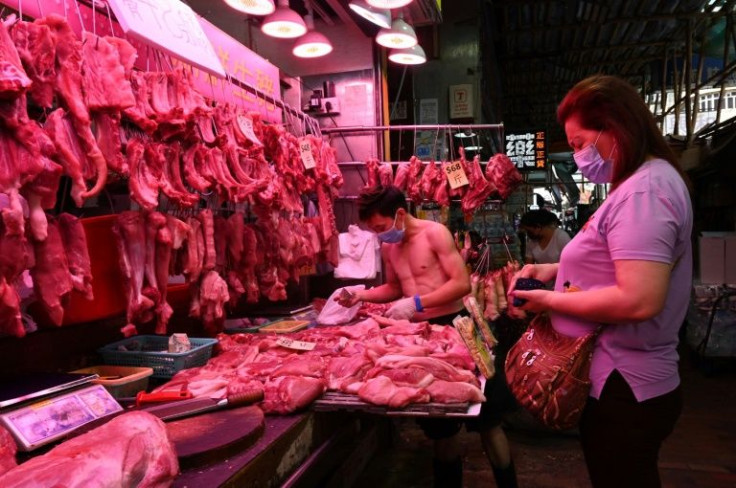China Mulls Dipping Into Pork Reserves To Rein In Costs
Chinese authorities said Tuesday they could dip into pork reserves and ordered suppliers to slaughter more pigs in a bid to rein in the cost of the staple meat, after prices soared by almost a third year-on-year.
Beijing's top economic planner was forced to respond after pork prices in the country spiked, with regulators blaming suppliers for "blindly holding supplies" and being reluctant to sell.
The National Development and Reform Commission (NDRC) said that reluctance was aimed at boosting profits, ordering major suppliers to kill pigs at a "regular pace" and stop hoarding, Xinhua said.
Late last month the meat sold for 32 percent more than in June 2021, it added.
On Tuesday, the commission said it was "looking into a release of central pork reserves".
It has also instructed local governments to release supplies "in a timely manner" to guard against sharp price increases.
The Chinese government keeps massive stores of frozen pork in warehouses, occasionally releasing reserve meat to stabilise prices, especially during periods of peak demand including Lunar New Year.
Pork is the most commonly consumed meat in China, with the average person in the country eating more than 25 kilogrammes per year, according to OECD data.

The world's second largest economy has mostly been spared the impact of a global surge in food prices caused by Russia's war in Ukraine.
But pork prices were hit hard after the country's herds were devastated by African swine fever in recent years, causing consumer inflation to spike.
In 2019, authorities said they would free up land to restore production to pre-swine fever levels, and officials have since released supplies from stockpiles to rein in costs.
"As the prices of hogs continue to rise, pig farmers are turning losses into profits... farmers are now profiting about 60 yuan (about $9) per head," Ministry of Agriculture and Rural Affairs hog expert Wang Zuli told state broadcaster CCTV in an interview in June.
"We can say the darkest days for pig farmers are over," Wang said, adding that supplies were expected to grow.
Even Pay, an agriculture analyst at consultancy Trivium China, told AFP it was common during periods of rising pork prices for pig farmers to "delay sales of pigs that are ready for slaughter now, assuming they'll be able to make more next week, and the week after".
"But if the rise in pig prices is driven by real market factors rather than mostly by speculation, the reserve releases won't have much of an impact," Pay said, pointing to high feed and energy costs as well as rebounding demand from restaurants post-lockdown.
Beijing is keeping a close eye on food prices as Covid disruptions, on top of higher fertiliser and fuel costs and issues with access to equipment, threaten the autumn harvest of key crops such as soybean and corn.
© Copyright AFP 2024. All rights reserved.







